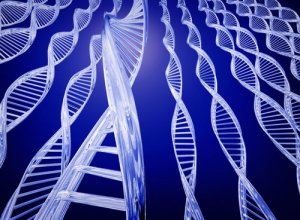-
(单词翻译:双击或拖选)
Nutrigenomics
The study of genes1 has shown that every individual is genetically unique, and this discovery leads to a host of questions as to the relationship between an individual’s genes and environmental factors such as diet.
That is, how does diet interact with one’s genetic make-up to affect one’s health? This is the primary concern of nutrigenomics. It is the study of how different foods interact with particular genes, affecting how these genes act or altering their structures.
Specifically, nutrigenomics is concerned with how chemicals in different foods can interact with particular genes to increase the risk of diseases such as type 2 diabetes, obesity, heart disease, and some cancers.
Nutrigenomics dictates2 that understanding how dietary chemicals regulate different genes will lead to individualized nutrition, the ability to design diets catered to one’s specific genetic make-up.
For example, the food pyramid developed by the USDA assumes that all Americans are the same and have the same dietary needs. Of course, the truth is that we’re not.
A lucky few of us can consume high fat diets and yet not develop heart disease, while others on moderate fat diets may develop heart disease.
Perhaps one day our doctors will read our DNA3 and take into account our genotype along with other environmental factors such as our physical activity. They may then prescribe us individualized diets, designed to match our unique nutritional4 needs.
This way, diseases such as cancer and Alzheimer’s may actually be slowed down or even prevented.

营养基因组学
由对基因的研究人们得出结论,每个人从遗传学的角度来看都是独一无二的。这一结论引出了一大堆的问题,例如人体基因与环境因素(如:饮食)之间的关系。
换句话说,饮食是如何与人体的基因相互作用,从而影响到人们的身体健康?这是营养基因组学关注的核心问题。营养基因组学是研究不同的食物是如何与特定的基因相互作用,进而影响这些基因的活动以及结构转变的科学。
特别要说明一点,这门科学关注的问题是:不同食物中的化学物质是如何与特定的基因作用来增加人体患病的风险的,这些疾病可能是2型糖尿病、肥胖症、心脏病和一些癌症。
在营养基因组学研究中,如果了解膳食化合物如何影响不同的基因,便可以研究出个性化营养方案,还可以根据一个人特定的基因构造来制定日常饮食计划。
比如说,由美国农业部发布的食物金字塔,我们可以做出假设:所有的美国人都是一样的,人们有着同样的饮食需求。当然,事实并非如此。
只有少数的幸运儿才可能在摄入高脂肪的食物后不患上心脏病,然,很多人就算食物脂肪含量适中也可能患上心脏病。
也许某一天,我们的医生能解读我们的DNA,同时将各人的基因型及其他的环境因素(如:体力活动)考虑在内。其后,再根据各人独特的营养需求开出个性化的饮食规定。这样一来,像癌症、老年痴呆这样的病的患病率就可能有所降低,甚至是得到预防!
 收听单词发音
收听单词发音
1
genes

|
|
| n.基因( gene的名词复数 ) | |
参考例句: |
|
|
|
2
dictates

|
|
| n.命令,规定,要求( dictate的名词复数 )v.大声讲或读( dictate的第三人称单数 );口授;支配;摆布 | |
参考例句: |
|
|
|
3
DNA

|
|
| (缩)deoxyribonucleic acid 脱氧核糖核酸 | |
参考例句: |
|
|
|
4
nutritional

|
|
| adj.营养的,滋养的 | |
参考例句: |
|
|
|

















